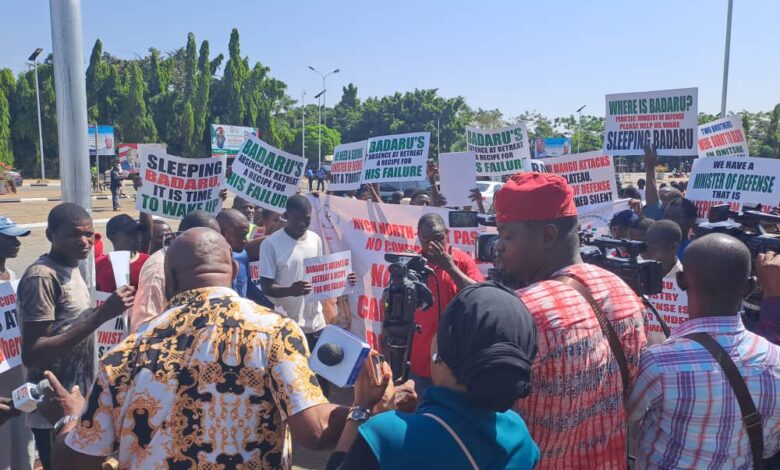Calls For Justice Heighten After Nigerian Army Drone Killed Over 100 Civilians In Error
On Dec. 9, representatives of the legal fraternities in the northern region, also known as the Concerned Northern Lawyers Forum, said in a statement that “such occurrences should have never happened in the first place, especially during a time of joyful celebration and unity”. They also say they will be instituting legal action against the federal government.

The recent killing of over 100 civilians by the Nigerian army has spurred agitations and calls for justice from concerned individuals and civil society organisations. On the night of Dec. 3, a group of Muslims were in a procession in the Tudun Biri village of Kaduna, North West Nigeria, when a fighter drone belonging to the army shelled the gathering, killing dozens of the merrymakers instantly and injuring several others.
The army first claimed responsibility for the attack and later apologised for conducting an erroneous air raid leading to the sudden death of over 100 unarmed civilians. Ground soldiers operating in Kaduna had told HumAngle that the army followed the wrong grid reference of the place it was meant to attack – which was a gathering of terrorists – and hit a different location, throwing the civilian community into mayhem.
Meanwhile, Nigeria’s army chief, Taoreed Lagbaja, offered an explanation many have termed ‘evasive’ of why the drone misfired, saying, “the general area of Tudun Biri and adjoining villages were infested with armed bandits, who terrorised the communities until troops of the Nigerian Army started conducting operations to sanitise the area and make it habitable.
“The troops were carrying out aerial patrols when they observed a group of people and wrongly analysed and misinterpreted their pattern of activities to be similar to that of the bandits, before the drone strike,” Lagbaja was quoted saying in an official statement released by the army spokesperson, Onyema Nnwachukwu.
The army chief was in Tudun Biri “to personally witness the site of the mishap and to convey sincere regrets and unreserved apologies on behalf of the Nigerian Army to the District Head and people of the community, as well as the government and entire people of Kaduna State.”
However, on Dec. 9, representatives of the legal fraternities in the northern region, also known as the Concerned Northern Lawyers Forum, said in a statement that “such occurrences should have never happened in the first place, especially during a time of joyful celebration and unity”.
“It is unacceptable and goes against the principles of justice and respect for human rights,” said Nafiu Abubakar, the group’s spokesperson. “Therefore, the Concerned Northern Lawyers Forum will be instituting legal action against the Federal Government, demanding the payment of adequate compensation for the victims and their families who have suffered irreparable loss as a result of this unfortunate incident.”
The group also urged the Nigerian Army to reevaluate its rules of engagement and training procedures to prevent the loss of unarmed civilian lives during military raids.
“It is vital that the Nigerian Army, as a defender of the nation, exercises utmost caution to avoid any further instances of collateral damage and civilian casualties,” the group said.
At a public function on Friday, Dec. 8, the Sultan of Sokoto, Abubakar Sa’ad, also condemned the killing, vowing to ensure that justice is served. The monarch said it is the responsibility of the army to protect lives and property and save them from terror attacks.
“We are going to take serious action to make sure something like this is not going to happen again anywhere in the country,” he said briefly. “The president has ordered a thorough investigation on it.”
Also, Bello Yabo, a popular Islamic scholar in Sokoto, says the northern region is bleeding, noting that the recent bombing of villagers during the Maulud celebration in Kaduna is a testament. The cleric claimed the killings persisted due to a lack of unity among northern leaders.
He also said: “North is bleeding, bandits kill us, hunger kills us, and the military that is supposed to protect us are also killing us. This is too much for us…”
Although President Bola Tinubu has asked for an in-depth investigation into the true cause of the army misfire, the National Security Adviser (NSA), Nuhu Ribadu, says the most important thing is to move forward after the tragic bombing of Tudun Biri villagers.
“We are here to physically see and also talk directly to the people, victims, and families and make an assessment for the Federal Government,” Ribadu said during his visit to the site of the bombing in Kaduna. “It is a tragedy and misfortune. But it has happened. What matters is how we move forward, what we are going to learn from here, and what exactly we need to do.”
Support Our Journalism
There are millions of ordinary people affected by conflict in Africa whose stories are missing in the mainstream media. HumAngle is determined to tell those challenging and under-reported stories, hoping that the people impacted by these conflicts will find the safety and security they deserve.
To ensure that we continue to provide public service coverage, we have a small favour to ask you. We want you to be part of our journalistic endeavour by contributing a token to us.
Your donation will further promote a robust, free, and independent media.
Donate HereStay Closer To The Stories That Matter




